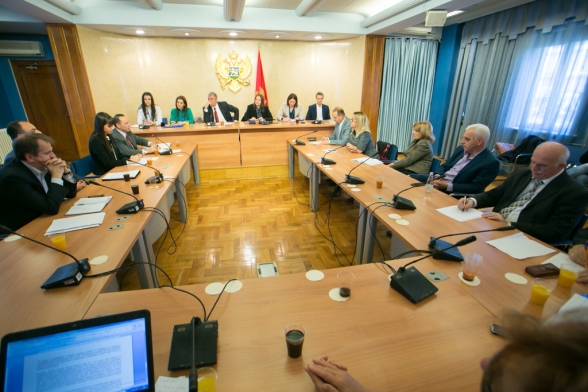At today’s 57th meeting meeting of the Committee, ODIHR experts: Ms Karolina Leaković, Mr Nedim Hogić and Ms Lana Ačkar presented the Guidelines for Gender-Responsive Parliament of Montenegro.
The Guidelines should serve as an instruction for drafting a plan for greater respect of gender aspect through parliamentary work. The adoption and implementation of this plan should influence on raising awareness on gender equality issues, and establishing mechanisms for achieving gender equality in the Parliament of Montenegro. This is also one of the measures covered by the 2015 Action Plan for Strengthening the Legislative and Oversight Role of the Parliament of Montenegro.
The Guidelines represent aims that should be achieved in six fields: Leadership and Commitment; Gender Balance in Political Engagement; Gender-Responsive Legislation and Policy; Parliamentary Service and Infrastructure; Awareness on Gender Equality in Parliamentary Culture and Parliament as an Advocate of Gender Equality.
In addition to members of the Gender Equality Committee and Administrative Committee, the meeting was attended by: Secretary General of the Parliament of Montenegro Mr Siniša Stanković, Head of the Secretary General’s Office Ms Irena Mijanović, Acting Program Manager of the Democratization Department of the OSCE Mission to Montenegro Ana Milutinović, Senior Adviser in the Democratization Department of the OSCE Mission to Montenegro Ms Vanja Šćepović, Head of the Department for Gender Equality in the Ministry for Human and Minority Rights Biljana Pejović, advisors in the Ministry of Education and Administration for Inspection Affairs Ms Vjera Kovačević and Ms Lucija Adžić.
The Committee asked for the support of the OSCE Mission to Montenegro, with the aim of obtaining expert assistance for drafting this document and analysing comparative experiences. Recognising drafting of this document as important for achieving gender equality in Montenegro, OSCE Mission to Montenegro has supported the work of the Gender Equality Committee, hiring, with the ODIHR support, experts who have drafted the Guidelines.









